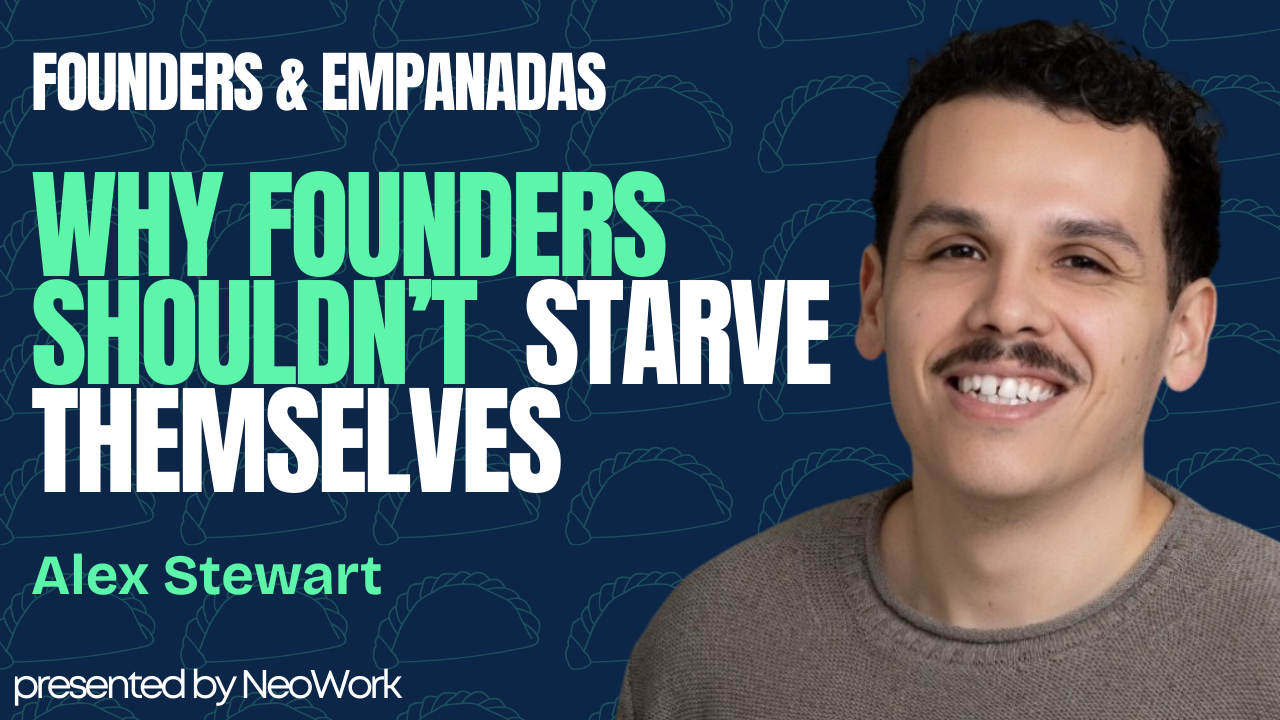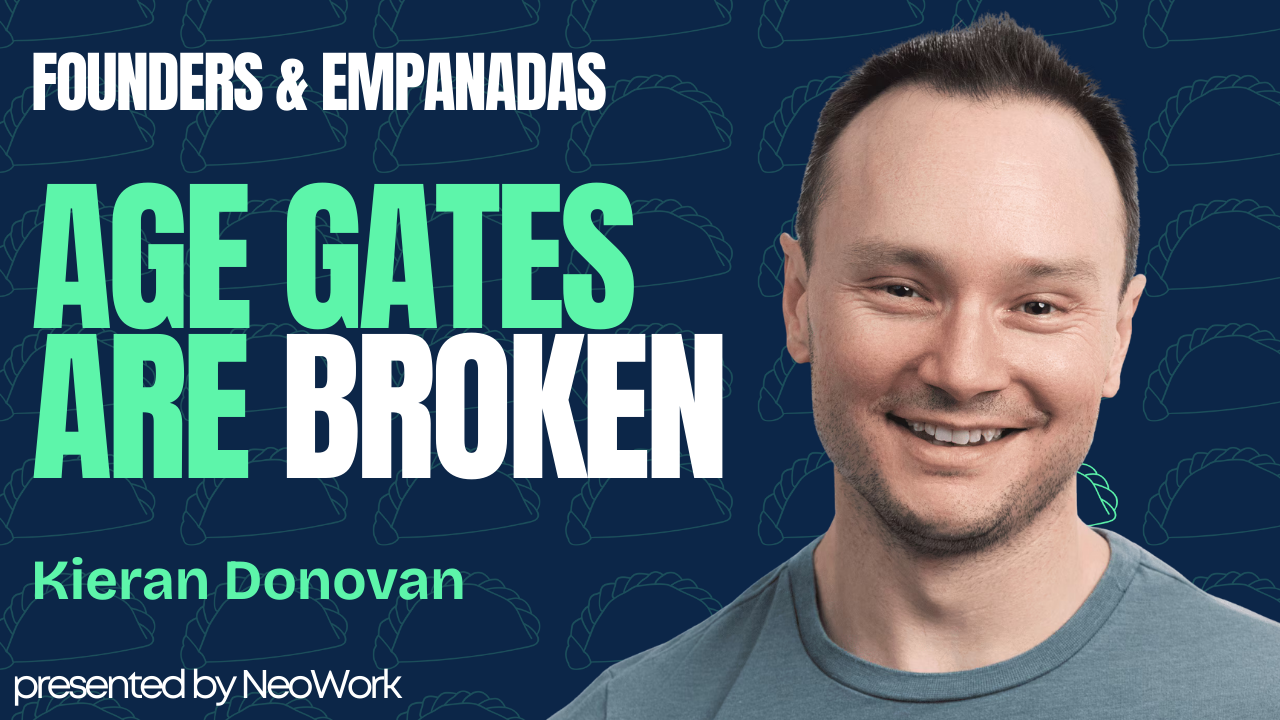.avif)
.png)
In this very special first episode of Founders & Empanadas, I had the pleasure of chatting with Mark Pecota, the CEO and Co-Founder of LaunchBoom. Mark's journey in crowdfunding started back in 2013 with the EcoQube campaign on Kickstarter and he has since helped clients raise over $100 million across 40+ countries. He also wrote the best-selling book Crowdfunded (seriously, just search "crowdfunding" on Amazon).
Mark went deep into the world of product launches and building sustainable businesses. While we talked a lot about crowdfunding, Mark's insights apply to broader challenges faced by founders today. We got into building momentum before a launch, understanding your audience, and adapting when the market throws you a curveball. What I found particularly interesting was Mark's journey from running a general marketing agency to focusing specifically on crowdfunding - it's a great example of how finding your niche can lead to some pretty amazing things.
If you're curious about the ins and outs of successful product launches or just looking for some fresh perspectives on growing a business, I think you'll find our chat with Mark both insightful and relatable.
Give it a listen here:
Here are the key insights we’ll explore below
- The Power of Pre-Launch Preparation in Ensuring Campaign Success
- Shifting Focus to Customer-Centric Storytelling for Effective Marketing
- Leveraging Technology to Scale While Maintaining Personalized Service
- Building Sustainable Businesses Beyond Initial Campaign Success
- Adapting to Market Shifts and Economic Changes
Building Pre-Launch Momentum: The Foundation of Success
Mark's approach to crowdfunding is rooted in meticulous preparation, emphasizing that success is often determined long before a campaign goes live:
The pre-launch is the most important part. We help drive ads using meta ads to a landing page, collect email addresses, and have people put down deposits. Then we email market to them. That's the crux of the whole system.
This focus on pre-launch work is key in crowdfunding. Rather than relying on the platform's traffic, Mark's strategy builds a tailored audience primed to back the project. By securing commitments and engaging potential backers ahead of time, creators can launch with confidence, knowing they have a solid foundation of support. It's a bit like how tech startups often build a waitlist or run a closed beta - getting people excited and invested before you even open the doors can make a huge difference in those critical early days.
Customer-Centric Storytelling: Shifting the Narrative Focus
In crowdfunding, where thousands of campaigns compete for attention (more like crowdED funding, am I right? Okay I’ll stop), Mark has identified a key factor that separates successful campaigns from those that fizzle out:
It's really important to understand your client's story or your customer's story and be able to tell that as clearly and intriguingly as possible. A lot of founders focus too much on themselves or the wrong part of the story.
In an era where consumers are bombarded with content, the ability to tell a story that centers on the customer's needs and aspirations is crucial. This approach aligns with the growing emphasis on user-centric design and the rise of personalized marketing strategies. It's a reminder that in any field, understanding and articulating the customer's journey is more compelling than trying to flex and pat yourself on the back.
Tech-Enabled Scaling: Enhancing Human Expertise
As LaunchBoom has evolved, Mark has strategically integrated AI and automation to amplify their human expertise. This approach reflects a broader trend of using AI not to replace human input, but to enhance it:
We've built software that helps clients build their funnels, connect to advertising, Stripe for payment processing, and MailChimp for email marketing. We've even built AI tools, drawing on our experience from over a thousand campaigns.
The integration of AI and automation tools in LaunchBoom's workflow is nothing new in 2024, but that doesn’t mean it isn’t important. A lot of companies are using AI to augment human decision-making rather than replace it entirely. This balance allows for scaling operations while maintaining the nuanced understanding that comes from human experience and expertise. In crowdfunding and beyond, the challenge lies in identifying which processes benefit most from automation and which still require a human touch. At NeoWork, we partner with our clients to identify which processes are ripe for full automation versus AI-assisted human evaluation. We are the product before the product, covering manual processes for an enhanced user experience until they are eventually automated.
Beyond the Launch: Building Sustainable Businesses
Mark's vision for LaunchBoom extends far beyond just helping clients run successful campaigns. He sees crowdfunding as a springboard for long-term business success:
We're transforming a product idea into a dream business. It starts with figuring out the marketing, launching on Kickstarter, getting funding, and then goes through to having a successful launch. The end goal is the transformation from a day job to a dream job.
This holistic approach to crowdfunding mirrors the evolving perspective on startup growth at large. There's an increasing recognition that rapid, unsustainable growth often leads to long-term problems. Instead, the focus has shifted to building solid foundations that can support steady, sustainable growth. This mindset is particularly relevant as investors and entrepreneurs alike are prioritizing profitability and solid business models over user acquisition or hype.
Market Adaptability: Navigating Economic Shifts
The crowdfunding space, like many sectors, has experienced a lot of ups and downs in recent years. Mark had some observations on these shifts and market adaptability:
In 2021, we started to feel a pullback. There was artificial inflation in the economy, and pretty much anyone attached to e-commerce was experiencing a huge boom. It was great, but things started to come back down to earth a little bit.
The rapid shifts in the e-commerce and tech landscapes over the past few years have made it clear that no business model is immune to external forces. Successful companies, whether in crowdfunding or other sectors, are those that can read these market signals and pivot quickly. This might involve diversifying revenue streams, adjusting marketing strategies, or even reimagining core products or services to meet changing consumer needs.
Topics
Product Launches & Sustainable Business Practices Through the Lens of Crowdfunding Expert Mark Pecota
In this very special first episode of Founders & Empanadas, I had the pleasure of chatting with Mark Pecota, the CEO and Co-Founder of LaunchBoom. Mark's journey in crowdfunding started back in 2013 with the EcoQube campaign on Kickstarter and he has since helped clients raise over $100 million across 40+ countries. He also wrote the best-selling book Crowdfunded (seriously, just search "crowdfunding" on Amazon).
Mark went deep into the world of product launches and building sustainable businesses. While we talked a lot about crowdfunding, Mark's insights apply to broader challenges faced by founders today. We got into building momentum before a launch, understanding your audience, and adapting when the market throws you a curveball. What I found particularly interesting was Mark's journey from running a general marketing agency to focusing specifically on crowdfunding - it's a great example of how finding your niche can lead to some pretty amazing things.
If you're curious about the ins and outs of successful product launches or just looking for some fresh perspectives on growing a business, I think you'll find our chat with Mark both insightful and relatable.
Give it a listen here:
Here are the key insights we’ll explore below
- The Power of Pre-Launch Preparation in Ensuring Campaign Success
- Shifting Focus to Customer-Centric Storytelling for Effective Marketing
- Leveraging Technology to Scale While Maintaining Personalized Service
- Building Sustainable Businesses Beyond Initial Campaign Success
- Adapting to Market Shifts and Economic Changes
Building Pre-Launch Momentum: The Foundation of Success
Mark's approach to crowdfunding is rooted in meticulous preparation, emphasizing that success is often determined long before a campaign goes live:
The pre-launch is the most important part. We help drive ads using meta ads to a landing page, collect email addresses, and have people put down deposits. Then we email market to them. That's the crux of the whole system.
This focus on pre-launch work is key in crowdfunding. Rather than relying on the platform's traffic, Mark's strategy builds a tailored audience primed to back the project. By securing commitments and engaging potential backers ahead of time, creators can launch with confidence, knowing they have a solid foundation of support. It's a bit like how tech startups often build a waitlist or run a closed beta - getting people excited and invested before you even open the doors can make a huge difference in those critical early days.
Customer-Centric Storytelling: Shifting the Narrative Focus
In crowdfunding, where thousands of campaigns compete for attention (more like crowdED funding, am I right? Okay I’ll stop), Mark has identified a key factor that separates successful campaigns from those that fizzle out:
It's really important to understand your client's story or your customer's story and be able to tell that as clearly and intriguingly as possible. A lot of founders focus too much on themselves or the wrong part of the story.
In an era where consumers are bombarded with content, the ability to tell a story that centers on the customer's needs and aspirations is crucial. This approach aligns with the growing emphasis on user-centric design and the rise of personalized marketing strategies. It's a reminder that in any field, understanding and articulating the customer's journey is more compelling than trying to flex and pat yourself on the back.
Tech-Enabled Scaling: Enhancing Human Expertise
As LaunchBoom has evolved, Mark has strategically integrated AI and automation to amplify their human expertise. This approach reflects a broader trend of using AI not to replace human input, but to enhance it:
We've built software that helps clients build their funnels, connect to advertising, Stripe for payment processing, and MailChimp for email marketing. We've even built AI tools, drawing on our experience from over a thousand campaigns.
The integration of AI and automation tools in LaunchBoom's workflow is nothing new in 2024, but that doesn’t mean it isn’t important. A lot of companies are using AI to augment human decision-making rather than replace it entirely. This balance allows for scaling operations while maintaining the nuanced understanding that comes from human experience and expertise. In crowdfunding and beyond, the challenge lies in identifying which processes benefit most from automation and which still require a human touch. At NeoWork, we partner with our clients to identify which processes are ripe for full automation versus AI-assisted human evaluation. We are the product before the product, covering manual processes for an enhanced user experience until they are eventually automated.
Beyond the Launch: Building Sustainable Businesses
Mark's vision for LaunchBoom extends far beyond just helping clients run successful campaigns. He sees crowdfunding as a springboard for long-term business success:
We're transforming a product idea into a dream business. It starts with figuring out the marketing, launching on Kickstarter, getting funding, and then goes through to having a successful launch. The end goal is the transformation from a day job to a dream job.
This holistic approach to crowdfunding mirrors the evolving perspective on startup growth at large. There's an increasing recognition that rapid, unsustainable growth often leads to long-term problems. Instead, the focus has shifted to building solid foundations that can support steady, sustainable growth. This mindset is particularly relevant as investors and entrepreneurs alike are prioritizing profitability and solid business models over user acquisition or hype.
Market Adaptability: Navigating Economic Shifts
The crowdfunding space, like many sectors, has experienced a lot of ups and downs in recent years. Mark had some observations on these shifts and market adaptability:
In 2021, we started to feel a pullback. There was artificial inflation in the economy, and pretty much anyone attached to e-commerce was experiencing a huge boom. It was great, but things started to come back down to earth a little bit.
The rapid shifts in the e-commerce and tech landscapes over the past few years have made it clear that no business model is immune to external forces. Successful companies, whether in crowdfunding or other sectors, are those that can read these market signals and pivot quickly. This might involve diversifying revenue streams, adjusting marketing strategies, or even reimagining core products or services to meet changing consumer needs.
Topics
Related Blogs
Related Podcasts














